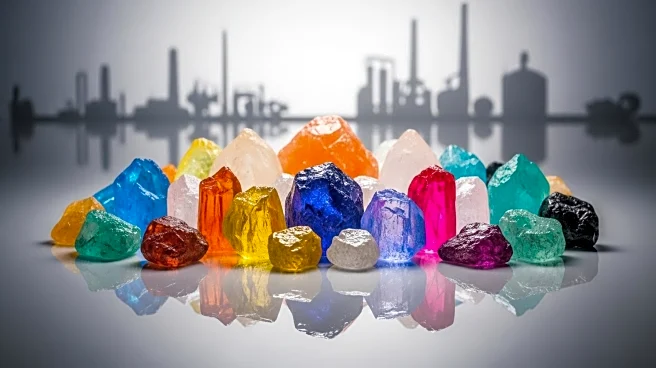What's Happening?
China's Ministry of Commerce has implemented stricter export controls on rare earth elements, a move that restricts the export of various processing and manufacturing technologies. This decision also prohibits companies from engaging in unauthorized overseas cooperation. Rare earth elements are crucial for the production of high-tech devices, including smartphones, electric vehicles, and military equipment. China's action is likely to impact global supply chains, as the country is a leading producer of these materials. The new regulations are part of China's broader strategy to maintain control over its valuable resources and ensure that its technological advancements are not easily replicated by foreign entities.
Why It's Important?
The tightening of export controls by China on rare earth elements is significant for several reasons. Firstly, it could lead to increased costs and supply chain disruptions for industries reliant on these materials, particularly in the United States and other countries that depend on imports for their tech manufacturing. This move may also prompt countries to seek alternative sources or invest in domestic production capabilities to reduce dependency on Chinese exports. Additionally, the restrictions could escalate trade tensions between China and other major economies, potentially affecting diplomatic relations and international trade policies.
What's Next?
In response to China's tightened controls, affected countries may explore diplomatic channels to negotiate more favorable terms or seek exemptions. Industries reliant on rare earth elements might accelerate efforts to diversify their supply chains or invest in research to develop substitutes for these materials. Governments could also increase funding for domestic mining and processing projects to reduce reliance on imports. The situation may lead to further geopolitical negotiations and adjustments in international trade agreements.
Beyond the Headlines
The decision by China to tighten export controls on rare earth elements highlights the strategic importance of these materials in global technology and defense sectors. It underscores the need for countries to reassess their resource dependencies and consider the geopolitical implications of relying on a single dominant supplier. This development may also spur innovation in recycling and alternative materials, as industries seek sustainable solutions to mitigate the impact of supply chain disruptions.









